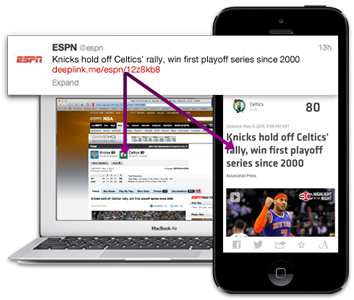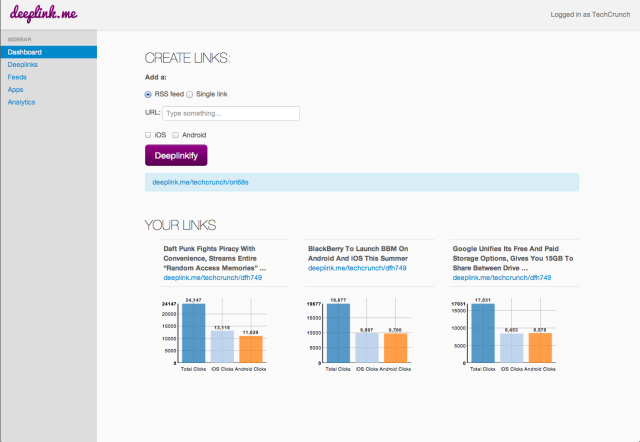Talk about a cryptic and vague title... No, but really, if you think about the evolution of the web and what contributed to its, "success" is a bit of an understatement, I think it's the hyperlinking between sites that did it.
I mean, without linking, where would we be on the web? There would be no Google search, there would be no content discovery, and most importantly, there would be a horrible user experience. We take it for granted now that when you click on that highlighted text, you are directed exactly where you wanted to go.
Now, think about mobile apps. Mobile app search is broken, discovery is completely flawed, and the overall user experience of navigating between apps is indeed inferior to the web. That is, it was, until Deeplink.me decided to do something about it.
Deeplink.me is a new service from Cellogic that has had several products over the years, including Flyscreen, which is in many ways a Facebook Home that preceded its time. Cellogic also has a product called Nextap, a broader deep linking network for apps, that lets you easily flow through the apps that are part of your daily habits.
While the infrastructure might be super technical and way above my head, the value is clear. With Deeplink.me, you can create and share a URL (web address, you know, like Google.com) for a specific piece of content from within an app. An article, a level in a game, whatever your heart desires. Full linking within apps, the way we are used to doing on the web.
The even cooler part is the actual URL. Deeplink.me will automatically detect what platform you are on and direct you to the right place. Whether it is Google Play, the App Store, or a mobile web app, the same URL acts differently depending on your current platform. In fact, if you are on iOS and you do not have the app installed, you will be redirected to the App Store to download it. Same goes for Android. If the app is installed, you will be redirected to the exact spot within the app. The final fallback option is the mobile web. They seem to have it all figured out over there at Cellogic.
The obvious benefactor here would be businesses that depend on distribution of their content, whatever type of content that might be, as well as mobile developers who are struggling to keep their users coming back.

I don't know about you, but at first glance, Deeplink.me doesn't feel like just another startup to me. It feels like a, and pardon me for the awful word, revolution in the world of mobile apps and their distribution. This feels like a new language of sorts, the kind that every app developer should and will adopt.
As far as the business goes, there are many options available to monetize such a platform. In addition to the actual linking, Deeplink.me provides in depth analytics of how that generated link performs. Who clicked on it? From where? What percentage of people clicked? Again, very web-like. Think Bit.ly for apps. How do I monetize that? Premium features for a price are the most obvious choice and that is indeed the avenue the company seems to be considering.

All in all, Deeplink.me is a very important step in the evolution of the mobile app space and it only leaves one question unanswered. What the heck took so long?